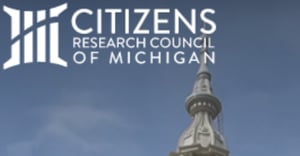 Lawmakers Can Ensure Federal Funding for Low-Income Students is Fair
Lawmakers Can Ensure Federal Funding for Low-Income Students is Fair
This school year, the federal government will direct nearly a half billion dollars to Michigan public schools to address the learning needs of children from low-income backgrounds. But, the federal Title I program makes little effort to ensure that ALL low-income students are treated fairly. The federal funding formula results in huge per-student inequities, even among school districts that educate similar student populations. This leaves some schools under-resourced when it comes to serving Michigan’s highest-need students.
IN A NUTSHELL
-- Federal Title I funding might appear progressive and equitable, but there remains substantial variation in the amount of per-student dollars that similarly-situated districts receive.
-- Michigan policymakers have no control over how the federal program operates and splits funds among the state’s 840 individual local school districts, but they do control other funding streams that can be used to address the inequities inherent in Title I.
-- Michigan lawmakers should address what Congress has gotten wrong over the past six decades and prioritize state budget resources to partially equalize the per-student allocations dictated by the federal formula.
Click here for more information on all public policy research and blogs released by the Research Council: www.crcmich.org and follow us on social media @crcmich.
More Analysis from our Blogs:
- Sustainable Funding for Local Governments
- Reducing the Stresses of Parenting Belongs on the Policy Agenda
- Michigan Could Increase Road Funding with a Truck Weight-Distance Fee
- Districts Should Consider Student-Based Budgeting to Address Literacy Challenges
- Growing Hazardous Weather Events Need Regional Mitigation Notice
RSVP Today for Statewide November Policy Events |
|
|
DETROIT -- Using Public Policy to Spur New Tech Innovation/R&D in Michigan November 18, 12-2 pm, New Lab Detroit Book Depository, Michigan Central You are invited to attend a unique research presentation and reaction panel that will explore the economics of innovation and the pivotal role of public policy in driving research and development for new technologies. Leading economists agree that economic innovation and productivity growth are fundamental to long-term economic prosperity and higher living standards. Over lunch, Senior Research Council analyst Robert Schneider will unveil critical findings from his recent report on the correlation between public policy and innovation. These findings have practical implications for the future of innovation and entrepreneurship in Michigan and beyond. |
|
|
GRAND RAPIDS -- Using Public Policy to Spur New Tech Innovation/R&D in Michigan November 20, 12-1:30 pm, Gerald R. Ford Presidential Museum You are invited to attend a unique research presentation and that will explore the economics of innovation and the pivotal role of public policy in driving research and development for new technologies. Leading economists agree that economic innovation and productivity growth are fundamental to long-term economic prosperity and higher living standards. Over lunch, Senior Research Council analyst Robert Schneider will unveil critical findings from his recent report on the correlation between public policy and innovation. These findings have practical implications for the future of innovation and entrepreneurship in Michigan and beyond. |
|
|
LANSING -- Emerging Leaders Council: Speakers and Listening Session November 21, 12-1:30 pm, SBAM Join us for the last ELC event of 2024. This Lunch & Learn event is being hosted by SBAM (Small Business Association of Michigan) featuring speakers, Kelli Saunders VP of Policy and Engagement, SBAM, Dan Wyant, Chairman and President of the Edward Lowe Foundation. We also will seek your input into what kind of policy research and analysis you think the Research Council should cover in 2025. The event offers a unique opportunity to make an impact on issues that should receive greater public awareness and discussion in 2025. |
The Research Council in the News |
|
Michigan per-capita income lags again: ‘it’s the lowest we’ve ever been’, Bridge Michigan, October 24 Michigan continues to bleed residents, losses to other states double in 2023, Bridge Michigan (October 24) Opinion: Here's the right way our state can invest in growth — and make a profit, Crain’s Detroit Business (October 11) As downtown grows, are Detroit neighborhoods paying the price?, Bridge Detroit (October 8) Report: To Fix The Damn Roads, Legislature Should Consider Weight-Distance Fees For Trucks, Gongwer (October 7) Downtown tax incentives are exacerbating the ‘two Detroits’ problem: report, Detroit Metro Times (September 30) Report says focusing on regions could boost Michigan prosperity, Michigan Advance (September 20) Detroit should re-evaluate tax captures for downtown development, report says, Crain’s Detroit Business (September 12) |
|
Seeking: Detroit Bureau Research Analyst |
|
|
The Citizens Research Council of Michigan, Michigan’s oldest and most trusted nonpartisan public affairs research organization, is seeking to hire an outstanding researcher to direct the following policy area: Detroit policy issues. This position will serve as the Research Council’s expert on policy matters such as the sustainability of the city budget, tax issues, transit, governance, service delivery, and charter issues. Other research might dig into school matters such as the school district budget, the relationship between the Detroit Public Schools Community District and charter schools, and right-sizing the schools to meet the number of students served. |
|
Do you want to ensure better policy decisions and better government in Michigan? A donation to support our organization will help us to continue providing the trusted, unbiased, high-quality public policy research Michigan needs. We also accept charitable bequests. Click the fuel tank to donate or learn more about planned giving. |
Founded in 1916, the Citizens Research Council of Michigan works to improve government in Michigan. The organization provides factual, unbiased, independent information concerning significant issues of state and local government organization, policy, and finance. By delivery of this information to policymakers and citizens, the Research Council aims to ensure sound and rational public policy formation in Michigan. For more information, visit www.crcmich.org
###




















